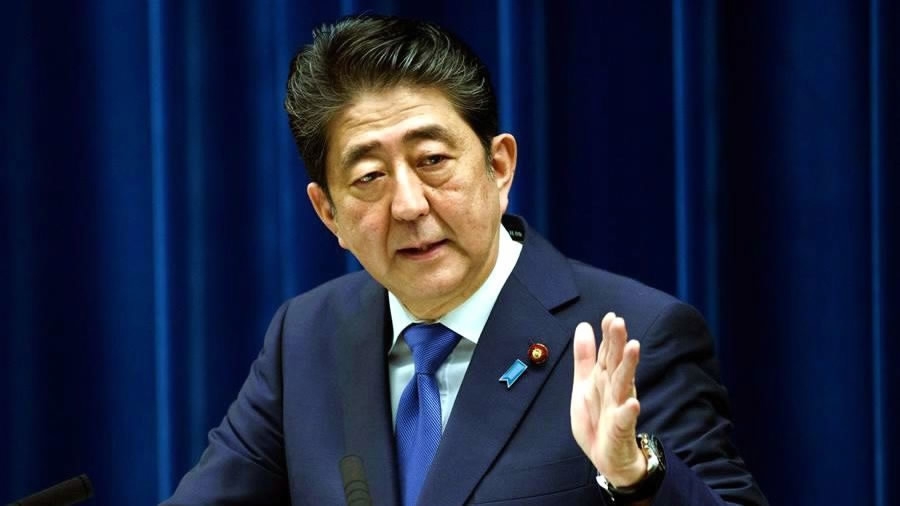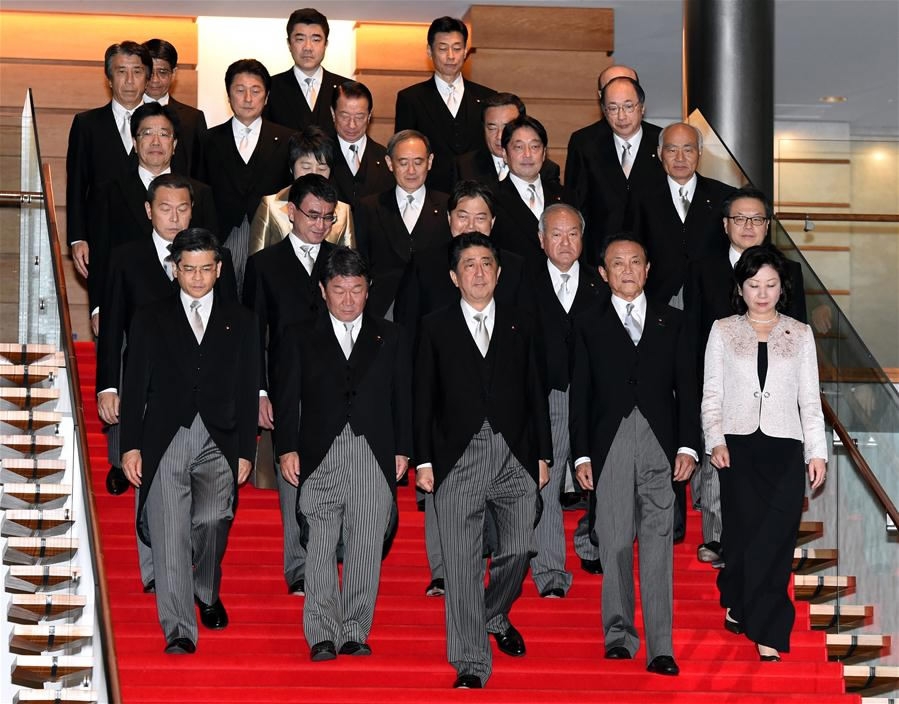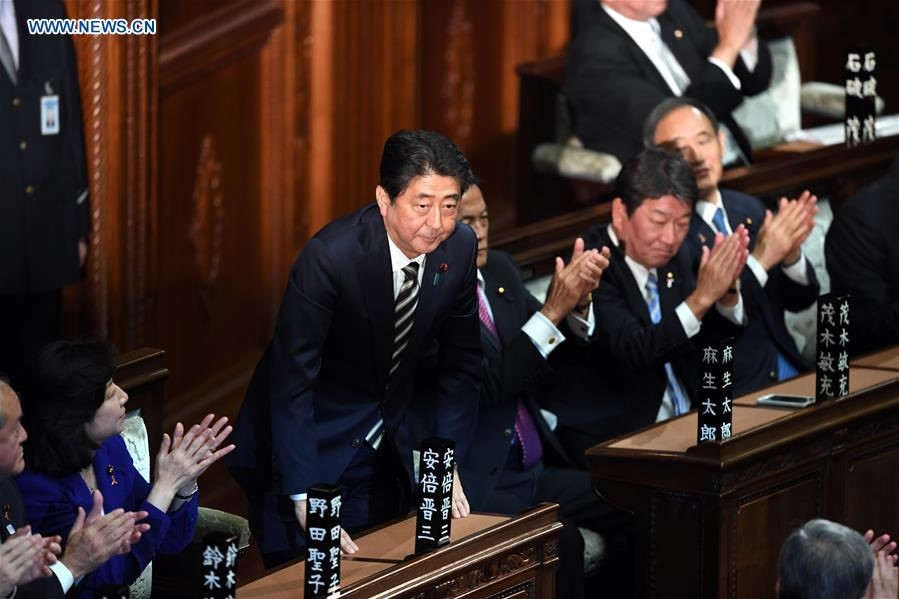
Opinions
14:45, 04-Nov-2017
Opinion: Is PM Abe’s ‘good will’ good enough for China?
Guest commentary by Zhang Fanghui, Hou Jun

Shinzo Abe, leader of the Liberal Democratic Party (LDP), was reelected as Japan's prime minister on Wednesday following the ruling party's sweeping victory in the October 22 lower house election in which the LDP-Komeito coalition secured 313 of the 465 seats, passing the 310-seat barrier thus getting the two-thirds majority necessary for constitutional change.
Abe's reappointment as the nation's top leader was guaranteed by a majority vote in the lower house, which he secured, with the lower chamber having final authority on the matter as decreed by Japan's Constitution. His fourth cabinet is now serving the country, and should Abe be able to sit at the helm through 2021, he would become the longest serving prime minister in Japanese history. With Sino-Japanese relations now at a critical juncture of difficulty and transition, whether Abe’s continued tenure will inject a dose of positive energy into the relations between the two neighbors not only merits our attention but also puts Abe’s “good will” in seeking friendlier relations with China to the test.
Since the beginning of 2017, Abe has been signaling willingness to improve relations with China. In May, in a departure from his usual disapproving attitude towards China’s Belt and Road Initiative, Abe first sent Toshihiro Nikai, Secretary-General of the Liberal Democratic Party, to attend the Belt and Road Forum for International Cooperation held in Beijing and later even hinted at Japan’s possible membership in the Asian Infrastructure Investment Bank (AIIB). In the August’s cabinet reshuffle, Abe appointed Taro Kono, son of Yohei Kono, a “China School” expert, to Minister of Foreign Affairs. On September 28, Abe made an unusual appearance at the Chinese embassy in Japan for a reception to commemorate the 68th anniversary of the founding of the People's Republic of China and the 45th anniversary of the normalization of Sino-Japanese relations. In his remarks at the event, Abe highlighted that “he is willing to contribute to the development of Sino-Japanese relations and pursue strategic mutual benefits for both countries in the days to come,” giving out more signals of his “good will” to mend fences with China.

Japanese Prime Minister Shinzo Abe (front C) and his cabinet members pose for photos at Abe's official residence in Tokyo, Japan, Nov. 1, 2017. /Xinhua Photo
Japanese Prime Minister Shinzo Abe (front C) and his cabinet members pose for photos at Abe's official residence in Tokyo, Japan, Nov. 1, 2017. /Xinhua Photo
We, of course, welcome all these positive signals from Abe. However, we still may have to adopt a wait and see policy here. Even though Abe has now secured another term, tangible results, such as boosting the country’s economy, must be delivered if he wants to consolidate his long-term ruling. Judging by where things stand at the moment, Abe does feel the need to improve relations with Beijing. Both the development of Sino-US relations and the need to boost the domestic economy have prompted Abe to attach importance to Sino-Japanese relations.
Japan-US relations are forcing Abe to attach importance to improving relations with China. The Japan-US alliance, which Japanese foreign policy is centered on, remains a top priority in Japan’s diplomacy. Given Japan’s long history of following the US’ lead, the development of Sino-Japanese relations is bound to be affected to some extent by the US. At present, the Sino-US relations are, on the whole, stable. The upcoming state visit by President Trump to China will most certainly add to the momentum of the two countries’ relations. Under such circumstances, Abe would do well to take stock of where the Sino-US relations are heading and act accordingly.
That said, the US is not what fundamentally determines Japan’s diplomacy. In times of the US and Russia antagonizing one another, Abe would commit himself to improving relations with Russia in hopes of resolving the territorial dispute with the country. Therefore, what to do on the diplomatic front is fundamentally tied to Japan’s national interests. Improving relations with China certainly serves Japan’s interests in beefing up its economy. At the moment, there is really not much for Abe to do as far as domestic policy is concerned. Despite a sixth consecutive quarterly increase, Japan’s economy is still mired in deflation. The Trans-Pacific Partnership (TPP) which Japan originally had high hopes for has now come under great strain following the US’ withdrawal from the treaty. China, now the second largest economy in the world, enjoys broad prospects for economic development. Improving relations with China, therefore, meets Japan’s need to grow its economy.

Shinzo Abe(3rd L), leader of the Liberal Democratic Party (LDP), bows as he is re-elected as prime minister, in Tokyo, Japan, on Nov. 1, 2017. /Xinhua Photo
Shinzo Abe(3rd L), leader of the Liberal Democratic Party (LDP), bows as he is re-elected as prime minister, in Tokyo, Japan, on Nov. 1, 2017. /Xinhua Photo
True as it may be that China and Japan are at odds on several issues which are not likely to be resolved any time soon, there is no doubt that the two countries do share some common ground. A lot of adjustments in Abe’s diplomacy towards China can be expected in his bid to strive for better relations with China. At the same time, we must watch out for both the possibility that Abe’s pursuit of improved relations with China is nothing but a means to his political ends and for his double-dealing practice of, say, paying lip service to better relations with China and making trouble for China on the sly. Japan’s plan of proposing a routine strategic dialogue between Japan, the US, Australia and India to President Trump while he is visiting clearly shows Abe has a target in mind, which stands in stark contrast with previous friendly gestures. Besides, whether Abe will sell the so-called “China Threat” as a catalyst in his effort to revise the country’s pacifist constitution in order to legitimize changes to Japan’s armed forces and how they operate, or if the country will remain on a track of peaceful development, is worth both our alert and attention.
This year marks the 45th anniversary of the normalization of the Sino-Japanese relations, and next year the 40th anniversary of the Treaty of Peace and Friendship between the People's Republic of China and Japan. Both occasions carry with them great opportunities for China and Japan to mend fences with each other. Only by taking a sensible look at and accepting China’s rise, adhering to the relevant documents and agreements, and translating the “good will” to improve relations with China into concrete actions can Abe really contribute to the development of Sino-Japanese relations.
(Zhang Fanghui holds a PHD in international relations, Renmin University of China. Hou Jun is a researcher at the Pangoal Institution and APD Institute. He holds a PHD in international relations from China Foreign Affairs University. The article reflects the authors' opinions, and not necessarily the views of CGTN.)

SITEMAP
Copyright © 2018 CGTN. Beijing ICP prepared NO.16065310-3
Copyright © 2018 CGTN. Beijing ICP prepared NO.16065310-3